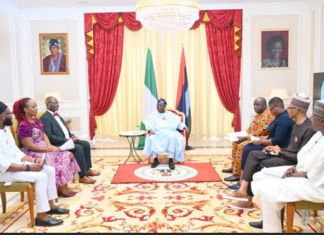For decades a discourse on devaluation never passes without remembering the sleight of hand of the then British Prime Minister, the late Harold Wilson. Caught in a pickle after the devaluation of the British currency, the pound sterling, he made the infamous observation that ‘the pound in your pocket is still (presumably worth) a pound. This faux pas has never been forgotten.
Fast-forward to Nigeria in the year of the Lord 2014. No sleight of hand can convince anyone that the Naira ‘in your pocket is still worth the same four weeks ago.’ The ubitiquous market mummy in any one of our great markets already knows this, as who is being fooled? No one in particular.
Not least the stakeholders who are reeling in the consequences of the Naira depreciating by about 13 per cent after the devaluation. No one needs to have the tools of an econometrician to anticipate a rate of about 200 naira/$1 after the traditional end of the year remittances of hard currencies from abroad. This is not being alarmist. For, as the ever thoughtful, must-read syndicated column, ‘Les Leba’ has pointed out, such a looming scenario will be accompanied with “inevitable, severe social and economic consequences.”
In addition, ‘Les Leba’correctly as usual, pointed out that, “We cannot exempt any stakeholder or economic sector from the ravages of the ill wind of the recent naira devaluation.” Absolutely! With tumbling oil prices it is painfully real. Crude oil exports accounts for 85per cent of Federal Revenues in an import dependent economy. This is why ‘….. no one is exempt.’
Certainly not the manufacturers or more precisely what is left of that once promising sector. The representatives of that sector are already warning about the looming calamity. The organized private sector is warning that it could all snowball into a major economic crisis if no urgent steps are taken. And not just them. Already, everyone is noticing the effect on consumer prices as well as the prices of a key indicator – the building materials sector.
This is why those on the hustings must address this critical issue. The general elections in February must be fought on economic issues, rather than on the self-serving mendacity of ethnicity and religion.
Like it or not, hard choices will have to be made. The Federal Government through the Coordinating Minister for the Economy Dr. Ngozi Okonjo-Iweala has made it clear that the tax-base has to be broadened to shore up the revenue base. “Loopholes and leakages” we are told will also be closed.
This is on the right lines. However, it is the tip of the iceberg. A move towards building a tax-payer based democracy is certainly desirable. For a real democracy is actually a community based on the contributions of millions of tax-payers. This modus operandi of Nigeria’s parasitic, rentier economy cannot be sustained.
Whoever wins in February will be forced to take the hard decisions. For there is nothing temporary in the present situation. We are faced with a profoundly long-term structural dysfunction. The hard decisions can only be postponed until after the election, nevertheless they will have to be taken.
They must include – draconian cuts in the non-personnel costs of the machinery of government. The delusions of grandeur associated with myriads of special advisers and assistants, befitting banquet halls and state houses, unnecessary junketing and so forth have to be jettisoned. We must now have smart, cost-effective government. There has to be a shift from consumption to production or we perish.
Furthermore, the monetary policies which have led to ruinous consequences for the generality of the people must be jettisoned. The currency has to be protected for it to have real value. For currency depreciation will deepen poverty and enable economic distortions. We must learn from the mistakes of the 1980’s structural adjustment programme.
This is why the people of this country, the media and the organs of civil society must, as a matter of urgency, demand for a real debate on the economy by all those seeking office.
This is why the people of this country, the media and the organs of civil society must as a matter of urgency demand for a real debate on the economy by all those seeking office. There is frankly no alternative to this as we face a challenging future.













